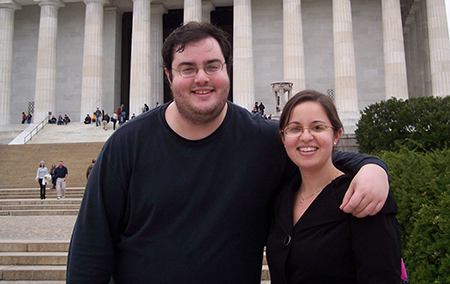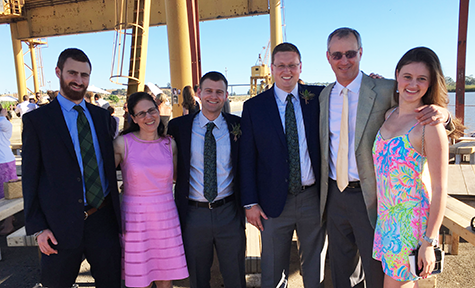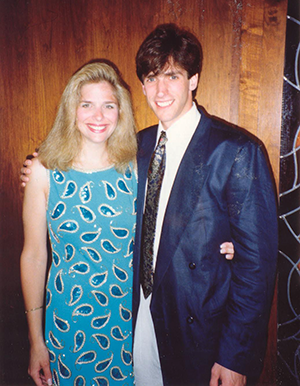Health + Medicine
Feature
Survivors of Suicide Loss

Rella Kaplowitz describes it as one of the scariest moments of her life: the first time she received an email from a suicidal stranger. The young man wanted to know how long it would take for his family to get over his death and move on. Kaplowitz had a flash of panic. What should she say? What should she not say?
The panic came not because Kaplowitz was unfamiliar with issues of mental health and suicide, or their impact on families. Rather, it was because she knew them firsthand. Kaplowitz, who lives in Washington, D.C., lost her brother, Eytan Kaplowitz, to suicide in 2010 when she was 26 and he was 23. After his death, Kaplowitz became a mental health advocate and volunteer with the American Foundation for Suicide Prevention, but before that first email, she had not counseled people in crisis. After calling colleagues for advice, Kaplowitz wrote the young man, “Your family will never get over it; they will never move on.” She then notified his parents.
Privately, Kaplowitz amends that statement. “I don’t consider it moving on,” she says of her experience after her brother’s death, “but I am moving forward. I volunteer. I speak out about my experience. I try to do as much as I can to make sure that nobody else has to go through what I did. Or, if someone is going through it, I do whatever I can to help them move forward. If I’m able to do that, then Eytan didn’t die for nothing.”
As a “survivor of suicide loss,” the term for those who have lost loved ones to suicide, Kaplowitz has tried to find meaning in a tragedy that can be as incomprehensible as it is devastating. Suicide is still surrounded by myth and misinformation, carrying the stigma and shame of mental illness and the shock of sudden death. The first reaction is almost always, “Why?” Why did this tragedy happen? What or who is responsible? And the terrible uncertainty: Could I have done something to save that person’s life?
These questions haunt more Americans every year. A report released by the Centers for Disease Control and Prevention in June 2018 found that suicide rates rose in nearly every state between 1999 and 2016, making it the 10th-leading cause of death overall. It is currently the second-leading cause of death for people ages 15 to 34. Culturally, we have begun to grapple with suicide, from Netflix’s controversial series about teenagers 13 Reasons Why to Broadway’s Dear Evan Hansen, and the global reactions to the recent suicides of designer Kate Spade and celebrity chef Anthony Bourdain.
Dr. Douglas Jacobs, a psychiatry professor at Harvard Medical School, is medical director and founder of the Wellesley, Mass.-based nonprofit Screening for Mental Health, which developed the campaign Stop a Suicide Today. Dr. Jacobs describes the grieving process after a suicide as fundamentally different from other kinds of loss. “There are layers of emotion,” he says, “from loss to anger to, ‘If I was good enough, my loved one would not have left me.’ ” He explains that rather than abandoning or punishing loved ones, people who end their lives are “in such extraordinary, intolerable psychological pain, that for a point in time they feel that suicide is the only option.”

According to the 2018 CDC report, 54 percent of people in the United States who died by suicide during that 17-year period did not have a known mental health condition. Clinicians and researchers say this points to the lack of diagnosis and treatment and that the majority of people who take their own lives are indeed suffering from depression or another mental illness in combination with other circumstances and stressors.
Boston parents Stephen and Carol Cohen describe their son Michael’s suicide in February as a “perfect storm” of circumstances. Michael, the eldest of the Cohens’ four children, was 28 when he took his life. He was an adventurous world traveler with many interests, deeply connected to family and friends. Although he sought therapy for depression, the Cohens say Michael concealed the severity of his symptoms. They can only speculate why he was secretive about his suicidal thoughts—perhaps stigma or shame, perhaps the high expectations that successful people have for themselves. Michael was fluent in Mandarin and worked in China for three years after college. In 2016, he returned to Boston and did translation work while looking for a job in technology.
In their grief, the Cohens examined the factors in their son’s life—the job search, a relationship issue, the challenge of returning to the United States—that may have played a role in his suicide. “When people have lost their children to, say, cancer, it is equally tragic,” says Carol Cohen, “but at least they can feel like they’ve done everything they could. With suicide, there are always questions: Could it have been prevented?”
It is crucial to inform the public that suicide can be prevented, experts say. Mental illness can be treated; anguish can be alleviated. But it leads survivors to ask: If suicide is preventable, then shouldn’t something or someone have prevented my loved one’s death?

Joanne L. Harpel, a mental health advocate and authority on suicide “postvention,” offers a clear analogy. “We know some things that can really reduce the risk of suicide,” says Harpel, “just like we know things that can really reduce the risk of heart attack. But we don’t yet have the ability to prevent an individual from dying by suicide at a given point in time. Just like people can die of heart disease or cancer, they can die as a complication of depression, bipolar disorder and schizophrenia.” Harpel urges anyone who is concerned about a loved one to trust their gut instinct and ask direct questions about that person’s state of mind. It is a misperception that mentioning the word suicide to a struggling person might trigger an attempt.
Harpel lost her brother Stephen Lelewer to suicide in 1993 when he was 26 and she was 29. His loss prompted her to leave a career in corporate law to eventually create Coping After Suicide, a practice in New York City that provides guidance to survivors as well as training for mental health professionals, clergy and funeral directors. Harpel says Stephen’s death also directly impacted the career choices of her two siblings. Her sister became a psychologist; her younger brother went into the rabbinate.
After a suicide, Harpel explains, grappling with the question why is almost a definitional part of the loss. For some people, the question is practical, focused on warning signs and risk factors. For others, it is an existential or spiritual question. Sometimes, it is both.
In the aftermath of their son’s suicide, the Cohens say they feel uncomfortable continuing their Jewish observance and are unable to recite prayers that glorify God. “Where was God?” asks Stephen Cohen. “If God doesn’t protect someone like Michael, who literally might have been one of the best people I’ve ever met in terms of just goodness, then what is God there for?”
Rabbi Adina Lewittes, scholar in residence at B’nai Jeshurun in Manhattan and the spiritual leader of Sha’ar Communities in northern New Jersey, has officiated at the funerals of several suicides. Rather than any religious explanation, she offers families “fellowship, compassion and empathy.” She defines this as unconditional support: “saying in word and deed that you will not be abandoned or judged or left behind on this agonizing journey of continuing to live in the wake of a loved one’s suicide.”
Lewittes points to an evolution in rabbinic thought about suicide across Jewish denominations, a movement away from punitive responses—like withholding burial in a Jewish cemetery or instructing families not to sit shiva—and toward a compassionate recognition of suicide as an expression of mental illness. The shift, she says, has developed alongside the medical community’s growing understanding of mental health issues.
“Jewish law never has and never will exist in a vacuum,” says Lewittes. “We are a tradition that is always enriched by an ongoing dialogue with the world around us.”
It is this sense of responsibility that inspired Efrem Epstein, 49, to found the Manhattan-based Elijah’s Journey in 2009, one of the few suicide prevention programs specifically serving the Jewish community. During an emotionally difficult period in 2006, Epstein had his own dialogue with God, basically saying: “Get me out of this, and I promise I’ll make a difference.” Epstein saw a need for Jewish organizations to make suicide awareness a higher priority. Named for the biblical prophet who, according to tradition, once pleaded with God to take his life, Elijah’s Journey creates educational materials like a guide to making a shiva call after a suicide. Epstein hopes his work will encourage more openness about mental health in Jewish communities and let those who are struggling know they are not alone.
While grief is a deeply personal process, survivors of suicide loss often find solace in support groups, social media groups, family rituals and bereavement counseling. Every year on her brother’s yahrzeit, Rella Kaplowitz makes a charitable donation in his name. This year, it was to the Refugee and Immigrant Center for Education and Legal Services. As the memorial candle burned, Kaplowitz tried to explain to her 3-year-old son why she was crying.
“There’s a great book that talks about an invisible string between your heart and someone else’s heart,” recounts Kaplowitz, “so even when you are apart, you are still connected through the love you share. So, I reminded him that there’s a string between his heart and my heart, and there’s a string between my heart and my brother’s heart. But he’s very far away, and I miss him a lot.”
IF YOU OR SOMEONE YOU KNOW NEEDS HELP
National Suicide Prevention Lifeline 800-273-8255
American Foundation for Suicide Prevention
Sarah Yahr Tucker is a writer based in Los Angeles, Calif. Her articles about health care and parenting have appeared in Vice, Good Housekeeping and Elle, among other publications.










 Facebook
Facebook Instagram
Instagram Twitter
Twitter
Rachel moorefield says
I started a vlog after the loss of my so. To suicide, please feel free to watch
https://youtu.be/tGi1CXYk3NY
Gaby Macaluso says
Gaby Macaluso
daaalin@yahoo.com